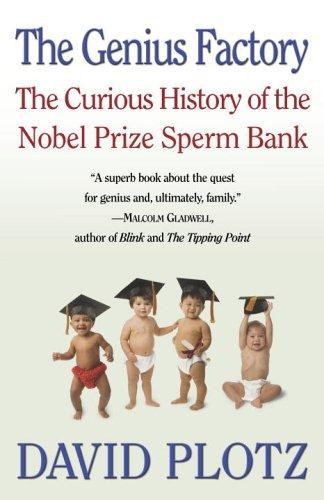
The Genius Factory
The Curious History of the Nobel Prize Sperm Bank
کتاب های مرتبط
- اطلاعات
- نقد و بررسی
- دیدگاه کاربران
نقد و بررسی

April 4, 2005
Building on a series of articles he wrote for Slate
, Plotz investigates the legacy of the Repository for Germinal Choice, a California sperm bank that was to have been stocked exclusively by Nobel laureates. Very few donors in the institution's 19-year run really had Nobels, and the one publicly acknowledged laureate was William Shockley, a notorious racist. Plotz has fun poking holes in the eugenic vision of the repository's founder, self-made millionaire Robert Graham, and his ambition to collect "the Godiva of sperm." More captivating, however, is Plotz's recounting of the efforts of the women who visited the repository to discover the identities of their donors. As he gets to know a cluster of families and donors, Plotz reaches insightful conclusions about the unforeseen emotional consequences of artificial insemination. The "reunions" his research helps bring about include the elderly scientist who adopts a grandfatherly role in a young girl's life and a teenager who takes his wife and infant son along to meet his "dad" and finds him sharing a house with Florida drug dealers. The attempt to breed genius babies may have an aura of surreal humor, but the sensitive narration always reminds us of the real lives affected—and created—through this oddball utopian scheme. B&w photos. Agent, Rafe Sagalyn.

June 1, 2005
This singular book examines the story behind the Repository for Germinal Choice-a sperm bank using only donations from Nobel Prize winners and others of high intellect. The bank, which closed in 1999, assured donors and mothers complete anonymity, so finding the participants to interview was difficult. In a 2001 article in the online magazine Slate (where he is deputy editor), Plotz appealed for stories from anyone connected with the repository-donors, mothers, recipients, and former employees. With the resulting feedback, Plotz and some of the sperm bank participants figured out several biological donor/child relationships-and the meetings between these biologically related strangers provide the most engaging parts of the book. Many writers have covered artificial insemination and eugenics, but very few have focused on sperm banks. Plotz's fascinating story, though it lacks the documentation of a true scientific study, raises several provocative questions about the nature/nurture debate and the meaning of family. Recommended for most public libraries.-Tina Neville, Univ. of South Florida at St. Petersburg Lib.
Copyright 2005 Library Journal, LLC Used with permission.

























دیدگاه کاربران